

Bauhaus.Listening.Workshop #1 - Montevideo

Spanish Version below
Directed by Nathalie Singer and co-curated by Florencia Gurci.
Supported and organised by the Goethe-Institut Uruguay and Lefteris Krysalis.
How has radio shaped our listening over the last 100 years? What practices and methods of listening have different cultures developed? How does radio relate to power structures and colonial history? What contribution could a culture of listening make in an increasingly globalised and at the same time polarised world in the future?
In the Bauhaus.Listening.Workshop we will observe our own habits of perception in an artistic-performative process, try out methods of listening and tell our own radio stories. We will explore the innovation potentials that emerge from the cultural heritage of local radio landscapes and their (post)colonial history. In the end, we want to address the question of the responsibility of the cultural technique of listening in a changing globalised, mobile and cosmopolitan society and develop new models for acoustic media of the future.
Venue:
Goethe-Institut Uruguay
Christiane Schulte and Irene Mueller
Santiago de Chile 874
11200-Montevideo, Uruguay
Kontakt: Irene.mueller[at]goethe.de
Nathalie Singer is professor for Experimental Radio at the Bauhaus-Universität Weimar. She worked as radio artist and producer, composed for various media, publishes on the topic of sound art. She was dramaturge in the radio play department of Deutschlandradio Kultur, where she developed new radio play formats (Wurfsendung). Her artistic research focuses on the development of radio art archives and their artistic mediation (traveling exhibition Radiophonic Spaces). Currently she created the Bauhaus.Listening.Workshop and is particularly interested in the cultural technique of listening and its potential in shaping new environments.
Florencia Curci works as a sound and radio artist, performer, curator, and cultural manager. Curci is the director of CASo (Sound Art Center), an institution of the Ministry of Culture of Argentina promoting artistic research on sound, radio art, experimental music and listening studies. Curcis work was commissioned by KunstRadio, AMEE, CA2M, Centro Cultural Kirchner and her live performances were presented in Festival Aural, MediaLab Prado, Tsonami Sound Art Festival among others.
Lefteris Krysalis is a radio and sound artist as well as a freelance researcher. He completed his bachelor’s degree in Art History and Theory at the Athens School of Fine Arts and his M.F.A in Media Arts and Design at the Bauhaus University Weimar in the chairs of Experimental Radio and Studio of Electroacoustic Music. He was a DAAD scholarship holder and guest teacher at the Bauhaus University Weimar. Currently he is artistic associate in the Experimental Radio and the project coordinator of the Radio Art Residency Weimar.
Goethe-Institut Uruguay: Christiane Schulte (Institute Director) and Irene Müller (Programme Coordinator) have been working on the topic of radio art since 2020 - a real discovery! With their initiatives, they work to create more space and attention for artistic production and reflection of radio art: on a local, regional and European level.
The Bauhaus.Listening.Workshop is part of the SENSE.LAB at the Bauhaus University Weimar. The Institute for Perceptual Skills and Consciousness Formation was launched in connection with the New European Bauhaus in order to help shape the change and transformation of our society in an aesthetic, integrative and sustainable way.
The Goethe-Institut Uruguay promotes knowledge of the German language abroad and fosters international cultural cooperation.
Goethe-Institut Uruguay | Sprache. Kultur. Deutschland, Gathering in a Better World - Goethe-Institut Uruguay
Versión española
Dirigido por Nathalie Singer con curaduría de Florencia Curci
Apoyado y organizado por el Goethe-Institut Uruguay y por Lefteris Krysalis
¿Cómo ha influido la radio en nuestra forma de escuchar en los últimos 100 años? ¿Quéprácticas y métodos de escucha han desarrollado las diferentes culturas? ¿Cómo serelaciona la radio con las estructuras de poder y la historia colonial? ¿Qué aporte podría hacer una cultura de la escucha en un mundo cada vez más globalizado y al mismo tiempo polarizado en el futuro?
En el taller Bauhaus.Listening.Workshop observaremos nuestros propios hábitos perceptivos en un proceso artístico-performativo. Observaremos los modos en que percibimos, probaremos métodos de escucha y contaremos nuestras propias historias radiofónicas. Exploraremos los potenciales de innovación que surgen del patrimonio cultural de los paisajes radiofónicos locales y de su historia (post)colonial. En definitiva, queremos abordar la cuestión de la responsabilidad de la técnica cultural de la escucha en una sociedad cambiante, globalizada, móvil y cosmopolita, y desarrollar nuevos modelos para los medios acústicos del futuro.
Nathalie Singer ist Professorin für Experimentelles Radio an der Bauhaus-Universität Weimar. Sie arbeitete als Radiokünstlerin und Produzentin, komponierte für verschiedene Medien, publiziert zum Thema Klangkunst. Sie war Dramaturgin in der Hörspielabteilung von Deutschlandradio Kultur, wo sie neue Hörspielformate (Wurfsendung) entwickelte. Ihre künstlerische Forschung konzentriert sich auf die Entwicklung von Radiokunstarchiven und deren künstlerische Vermittlung (Wanderausstellung Radiophonic Spaces). Aktuell hat sie den Bauhaus.Listening.Workshop ins Leben gerufen und interessiert sich besonders für die Kulturtechnik des Zuhörens und deren Potential zur Gestaltung neuer Umgebungen.
Florencia Curci arbeitet als Klang- und Radiokünstlerin, Performerin, Kuratorin und Kulturmanagerin. Curci ist Direktorin von CASo (Sound Art Center), einer Einrichtung des argentinischen Kulturministeriums zur Förderung der künstlerischen Forschung zu Klang, Radiokunst, experimenteller Musik und Hörstudien. Curcis Arbeit wurde von KunstRadio, AMEE, CA2M, Centro Cultural Kirchner in Auftrag gegeben und ihre Live-Performances wurden unter anderem beim Festival Aural, MediaLab Prado und Tsonami Sound Art Festival präsentiert.
Lefteris Krysalis ist Radio- und Klangkünstler sowie freiberuflicher Forscher. Er absolvierte seinen Bachelor in Kunstgeschichte und -theorie an der Athens School of Fine Arts und seinen M.F.A. in Media Arts and Design an der Bauhaus-Universität Weimar an den Lehrstühlen für Experimentelles Radio und Studio für elektroakustische Musik. Er war DAAD-Stipendiat und Gastdozent an der Bauhaus-Universität Weimar. Derzeit ist er künstlerischer Mitarbeiter am Experimentellen Radio und Projektkoordinator der Radio Art Residency Weimar.
Goethe-Institut Uruguay: Christiane Schulte (Institutsleitung) und Irene Müller (Programmkoordination) beschäftigen sich seit 2020 mit dem Thema Radiokunst – eine echte Entdeckung! Mit ihren Initiativen arbeiten sie daran, mehr Raum und Aufmerksamkeit für künstlerische Produktion und Reflexion von Radiokunst zu schaffen: auf lokaler, regionaler und europäischer Ebene.
The Bauhaus.Listening.Workshop ist Teil des SENSE.LAB an der Bauhaus-Universität Weimar. Das Institut für Wahrnehmungsfähigkeit und Bewusstseinsbildung wurde in Verbindung mit dem Neuen Europäischen Bauhaus ins Leben gerufen, um den Wandel und die Transformation unserer Gesellschaft auf ästhetische, integrative und nachhaltige Weise mitzugestalten.
The Goethe-Institut Uruguay fördert die Kenntnis der deutschen Sprache im Ausland und pflegt die internationale kulturelle Zusammenarbeit.
Goethe-Institut Uruguay | Sprache. Kultur. Deutschland, Gathering in a Better World - Goethe-Institut Uruguay
